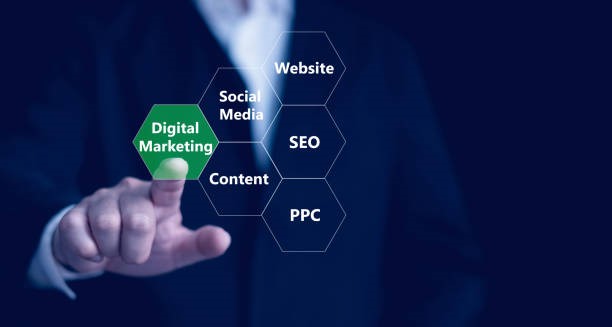Digital Marketing Strategies for Small Businesses
In today’s digital age, a robust online presence is no longer optional for small businesses—it’s essential for survival and growth. Digital marketing offers powerful tools and techniques to reach target audiences, build brand awareness, and drive sales. This comprehensive guide explores effective Digital Marketing Strategies for Small Businesses, providing practical tips, real-world examples, and actionable advice for small business owners, entrepreneurs, digital marketing professionals, startups, and marketing consultants.
Introduction: Leveling the Playing Field
Digital marketing has democratized the marketing landscape, allowing small businesses to compete with larger corporations on a more level playing field. By leveraging the right Online Marketing techniques, small businesses can reach their target audience effectively and achieve significant results without breaking the bank. This guide will provide a roadmap for navigating the digital marketing world and maximizing your online impact.
What is Digital Marketing? A Concise Definition
Digital marketing encompasses all marketing efforts that use an electronic device or the internet. It includes a wide range of strategies and tactics, such as search engine optimization (SEO), social media marketing, email marketing, content marketing, and paid advertising.
Key Digital Marketing Strategies for Small Businesses
Here are some essential Marketing Strategies that small businesses should prioritize:
-
Search Engine Optimization (SEO):
- SEO is the practice of optimizing your website and online content to rank higher in search engine results pages (SERPs), driving organic (non-paid) traffic to your website.
- SEO for Small Business Best Practices:
- Keyword Research: Identify relevant keywords that your target audience is searching for.
- On-Page Optimization: Optimize your website’s content, title tags, meta descriptions, and other on-page elements.
- Local SEO: Optimize your Google My Business profile and other local directories to improve visibility in local search results.
- Link Building: Build high-quality backlinks from other reputable websites.
-
Social Media Marketing:
- Social Media Marketing involves using social media platforms like Facebook, Instagram, Twitter, and LinkedIn to connect with customers, build brand awareness, and drive traffic to your website.
- Social Media Marketing Tips:
- Choose the Right Platforms: Focus on the platforms where your target audience is most active.
- Create Engaging Content: Share valuable and engaging content that resonates with your audience.
- Engage with Your Followers: Respond to comments and messages, and participate in relevant conversations.
- Run Targeted Ads: Use social media advertising to reach specific demographics and interests.
-
Content Marketing:
- Content Marketing involves creating and distributing valuable and relevant content to attract and retain a clearly defined audience — and, ultimately, to drive profitable customer action.
- Content Marketing Strategies:
- Blog Posts: Share informative and engaging blog posts on your website.
- Articles: Publish articles on industry websites or online publications.
- Videos: Create engaging videos for YouTube, social media, and your website.
- Infographics: Create visually appealing infographics to present data and information in a digestible format.
- Ebooks and White Papers: Offer valuable resources in exchange for contact information.
-
Email Marketing:
- Email Marketing involves building an email list and sending targeted emails to nurture leads, promote products or services, and build customer loyalty.
- Email Marketing Best Practices:
- Build an Email List: Offer valuable incentives to encourage website visitors to subscribe to your email list.
- Segment Your Audience: Segment your email list based on demographics, interests, or purchase history.
- Personalize Your Emails: Personalize your email messages to make them more relevant to each recipient.
- Track Your Results: Monitor key metrics such as open rates, click-through rates, and conversions.
-
Paid Advertising (Pay-Per-Click or PPC):
- Paid Advertising involves paying to display your ads on search engines, social media platforms, and other websites.
- Digital Advertising Platforms:
- Google Ads: Advertise on Google search results and the Google Display Network.
- Social Media Ads: Run targeted ads on Facebook, Instagram, Twitter, LinkedIn, and other social media platforms.
-
Local SEO:
- Local SEO focuses on optimizing your online presence to attract customers in your local area.
- Local SEO Best Practices:
- Google My Business: Claim and optimize your Google My Business profile.
- Online Directories: List your business in relevant online directories.
- Local Citations: Ensure your business information is consistent across all online platforms.
These strategies are essential for effective Small Business Marketing.
Real-World Examples of Digital Marketing Success
- A local bakery uses Instagram to showcase its delicious pastries and run targeted ads to reach customers in its area.
- A small online clothing boutique uses content marketing to publish blog posts about fashion trends and email marketing to promote new arrivals and sales.
- A local plumber optimizes their Google My Business profile and uses local SEO techniques to attract customers searching for plumbing services in their area.
These examples demonstrate the effectiveness of various Online Marketing techniques.
Practical Tips for Small Business Digital Marketing
- Start with a Clear Strategy: Define your target audience, goals, and budget.
- Focus on a Few Key Channels: Don’t try to be everywhere at once. Focus on the channels that are most relevant to your target audience.
- Track Your Results: Use analytics tools to monitor your performance and make data-driven decisions.
- Be Consistent: Consistent effort is key to achieving long-term results.
- Stay Up-to-Date: The digital marketing landscape is constantly evolving, so it’s important to stay up-to-date with the latest trends and best practices.
These tips are crucial for successful Digital Marketing.
Actionable Advice for Different Audiences
- Small Business Owners: Focus on building a strong online presence and providing a great customer experience.
- Entrepreneurs: Use digital marketing to validate your business ideas and reach your target market.
- Digital Marketing Professionals: Stay up-to-date with the latest trends and tools, and develop data-driven strategies.
- Startups: Use digital marketing to quickly scale your business and reach a wider audience.
- Marketing Consultants: Provide valuable advice and guidance to small businesses on their digital marketing strategies.
This advice offers targeted guidance for different professionals involved in Digital Advertising.
Measuring Digital Marketing Success
Key metrics to track to measure the success of your Digital Marketing efforts include:
- Website Traffic: The number of visitors to your website.
- Conversion Rates: The percentage of website visitors who complete a desired action, such as making a purchase or filling out a form.
- Engagement: The number of likes, comments, shares, and clicks on your social media posts and other online content.
- Reach: The number of people who have seen your content.
- Return on Investment (ROI): The measure of the profitability of your marketing investments.
Tracking these metrics is essential for optimizing your Marketing Strategies.
Budgeting for Digital Marketing
Determining a digital marketing budget will vary depending on your business size, industry, and goals. Start by allocating a realistic budget and track your ROI to determine the effectiveness of your spending.
Embracing the Digital Opportunity
Digital marketing offers immense opportunities for small businesses to grow and thrive in the modern marketplace. By implementing the right strategies, focusing on your target audience, and consistently tracking your results, you can build a strong online presence, attract new customers, and achieve your business objectives. This guide has provided valuable insights into Digital Marketing and Small Business Marketing best practices. By implementing these strategies and focusing on Online Marketing fundamentals like SEO for Small Business, Content Marketing, Email Marketing, and Paid Advertising, you can effectively leverage Digital Advertising to achieve significant results and propel your small business to success. Remember, consistency, adaptation, and a focus on providing value to your audience are key to navigating the ever-evolving digital landscape.






